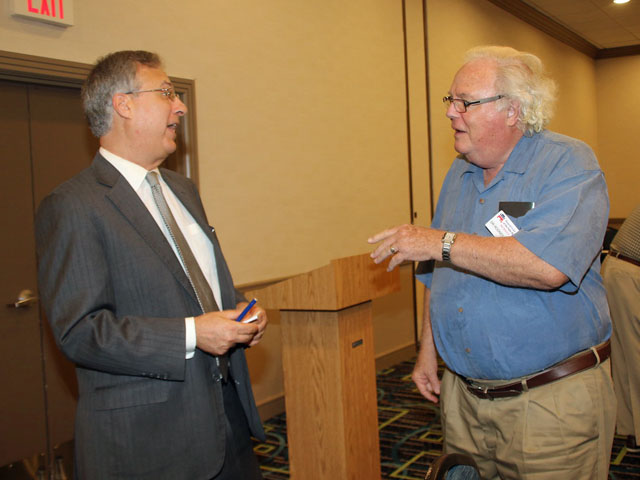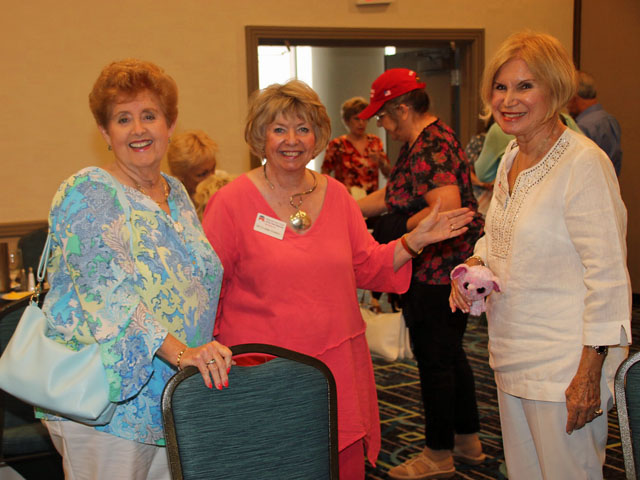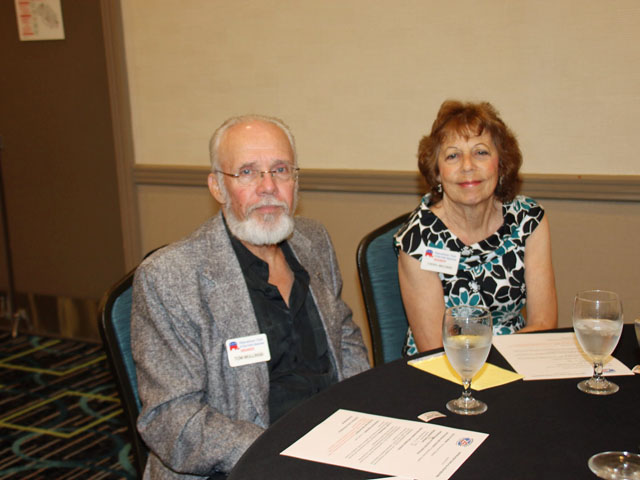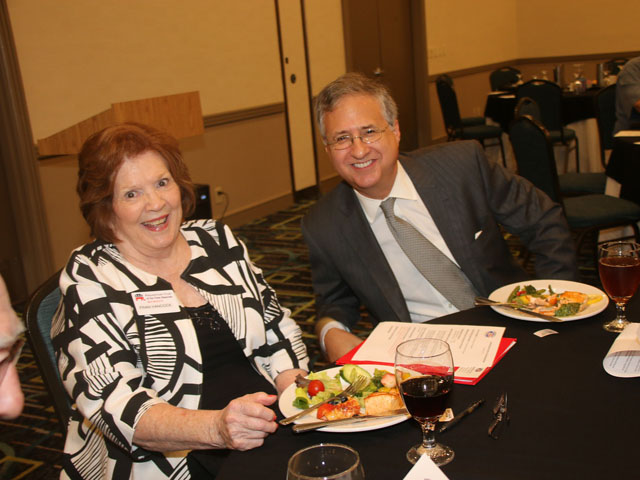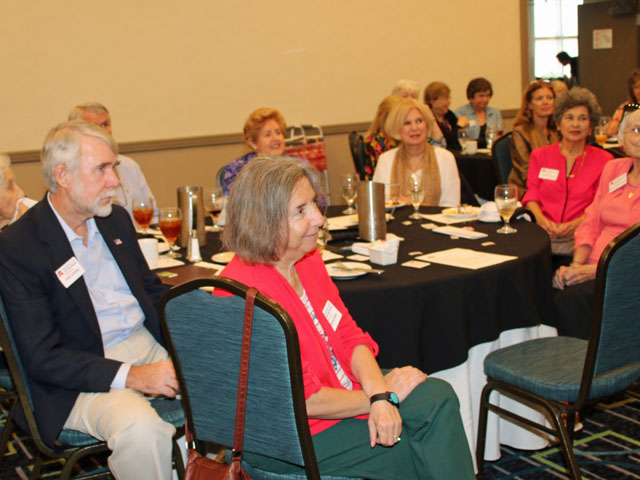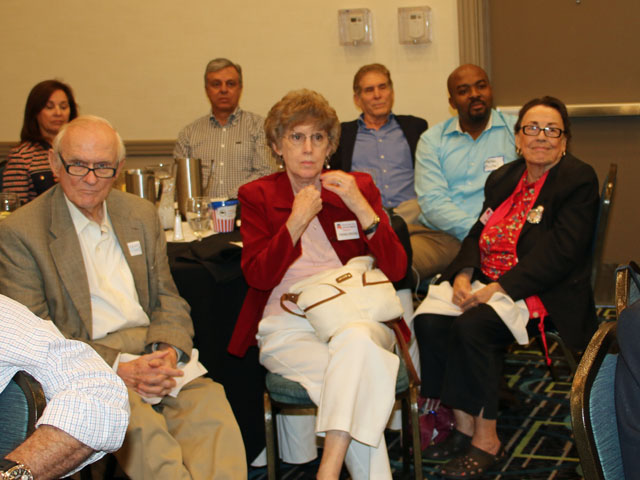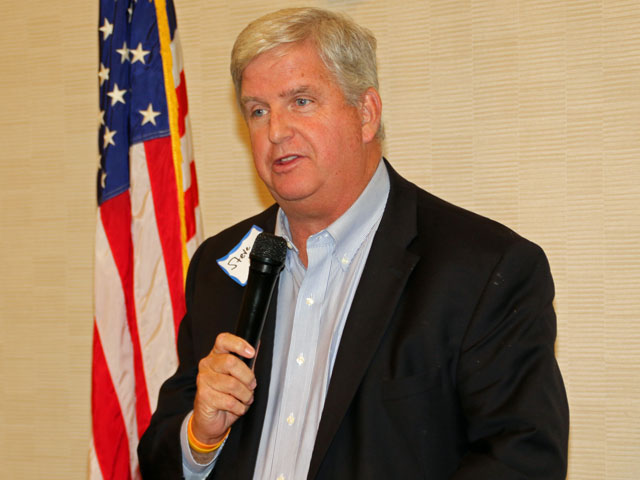Congressman Brian Mast Visits our November Veteran’s Event
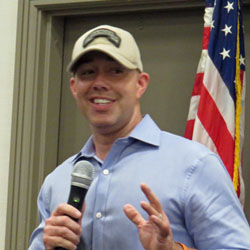
In our annual salute to veterans, of which there are quite a few among the club members, Army Veteran and Congressman Brian Mast recapped his first year in the House representing CD18.
Brian was introduced by Sid Dinerstein, who pointed out that although Brian’s seat has been targeted by the national Democrats mainly because of the narrow (R+4) district demographics, with popular State Attorney Dave Aronberg likely sitting it out the seat is not that much at risk if we all give Brian our support.
Club President Fran Hancock echoed that theme, pointing out that although some club members live outside the district, Brian is still “our” Congressman since he is the only Republican representing any district in Palm Beach County. As such, we should give him our support, our time and our money as he runs for re-election in 2018.
Brian’s remarks addressed some of the questions he was asked before the meeting got started.
A common question was “is Washington really as awful as it sounds?”. The answer is somewhat mixed. One of his pet peeves about many of those that inhabit that swamp is the total disingenuousness of his colleagues. It is hard to fathom how someone can call you vile names while in front of the cameras, then come by later and act as if they are your friend seeking support for their pet legislation. Not the way real people behave.
Brian was hopeful for passage of tax reform this year, and he was one of the needed votes for it to pass the House this past Thursday. What will happen in the Senate (where hundreds of bills have gone to die) is anybody’s guess, but the House has done their part. The House bill will be good for people in district 18 – statistics indicate that currently only 30% itemize, and the new standard deduction will drop that to 5-10%. What the left is spinning about tax cuts only for the rich is very misleading. Pointing out that the amount of taxes that are levied in each bracket is declining for all earners, tax reduction is real.
He spoke of his work on VA Legislation, and the fact that through his efforts, he now has a Congressional Office right in the West Palm Beach Medical Center. He encouraged veterans with problems with the system to drop by his office and seek his assistance. He also hoped that other representatives throughout the country choose to do the same and get offices at their local VA hospitals.
In the Q&A session that followed, he was asked what we could do to help. “Bring your friends to the townhalls” he said. That is the way to create new activists when they witness the rhetoric on the left and how he stands up to it.
At the conclusion of the meeting, members voted on the slate of officers for 2018 who will be installed at the December 6 lunch featuring Dimensional Harmony. They are President Fran Hancock, Vice President Fred Scheibl, Secretary Claire Anderson Jones, and Treasurer Bette Anne Starkey.
Property Rights Discussed at October Lunch
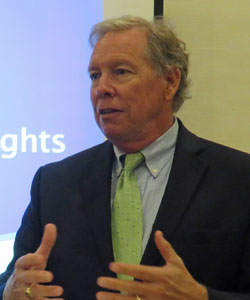
At the October lunch, Daniel Peterson, Director of the Center for Property Rights at the James Madison Institute in Orlando gave us his view of the legacy of property rights in the US, and the forces that threaten them today.
Contrasting the situation that existed in the Soviet Union, where all property was owned by the state and most people lived in apartments, he described our system dating back to the Puritan colony in New England were they considered individuals as “stewards of the land”.
Our system provides 5 rights associated with property: the freedom to possess property, to enjoy it without interference, to use it for our own purposes, to exclude others from it, and to dispose of it as we see fit.
Threatening these rights are three forces:
First is the “Government Estate” – ownership of land by governments that crowd out private uses. As example, 50% of all the land west of the Mississippi is owned by the federal government, including 83% of the state of Utah. This not only takes the land out of public use, but it starves state and local government of property tax revenue (sometimes offset by PILT – payment in lieu of taxes, where the locals are partially compensated by the federal landowner.)
In Florida, about a third of the state is government owned with 30% in conservation (37% in PBC). The cost of acquisition of these 2.5 million acres was about $2500 per acre under the P2000 and Florida Forever programs. Added is the cost of maintenance ($173M per year) and the cost of bonding ($145M / year).
Another threat is over reaching regulations, particularly things like the EPA’s “Waters of the US”, which attempted to restrict usage of most of the surface water in the country, (including presumably rain puddles in your backyard) and the “Clean Power Plan” which the Obama administration was using to destroy the coal industry and hamstring energy use and production.
The third threat is the Bureaucratic maze with its sometimes conflicting permitting requirements from all manner of jurisdictions that makes business creation or even enjoying your own property difficult.
Please join us next month as we salute veterans with Congressman Brian Mast on Saturday, November 18th. The usual lunch meeting will be free to all veterans – bring your friends!
Professor James Todd’s Views on the upcoming Supreme Court Term
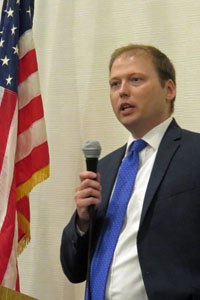
The Supreme Court begins its next term on Monday, the thirteenth presided over by Chief Justice John Roberts. What can we expect?
Our speaker yesterday, PBAU Professor James Todd, who specializes in American governmental institutions and constitutional law, gave us his perspective.
Professor Todd listed the three areas that he is watching – the actions of new Justice Neil Gorsuch, a set of interesting cases they are likely to take up, and the possibility of resignations in the near future.
Justice Gorsuch, who took office in April and participated in the end of the last session has had an auspicious start. As promised by President Trump, he is very much in the mold of Antonin Scalia – a very conservative jurist. For those cases in which he participated, Judge Gorsuch staked out the most conservative positions, even going so far as to write his own opinion when he thought the majority did not go far enough.
On the travel ban case for example, while the court mostly removed the lower court injunction pending review in the fall, but modified the ban to allow for exceptions, Judge Gorsuch (along with Clarence Thomas) opined that the executive was not to be second guessed by the judiciary on matters of national security. He also strongly affirmed the principal of religious liberty in the Missouri playground case – where a religious school was denied government funding for safety improvements by a lower court. The upcoming session should be interesting to watch.
Upcoming cases that Professor Todd thought would be addressed by the court include:
- The revised travel ban, after it makes its way through the lower court challenges. (The October hearing was canceled since the original ban ended and a modified one has been introduced that addresses some of the initial objections).
- Partisan gerrymandering – do partisan state legislatures have the right to define districts so as to advantage a particular party. He expects that the court may conclude that there is no constitutional issue here – it is all politics and should be addressed at the ballot box rather than the courtroom.
- The Colorado “wedding cake” case – does religious liberty allow a baker to refuse to make a cake for a gay wedding when in conflict with local anti-discrimination laws. The justice to watch in this case is Anthony Kennedy, who has typically been supportive of gay rights in other cases.
- Gender segregated bathrooms
- The Maryland AR-15 ban
- The right to privacy in cell phone records. The court has already decided that a warrant is needed to search the contents of a cell phone, but not the records maintained by the carrier.
- Should school boards be allowed to have a prayer at their meetings? Although the courts have ruled that governmental bodies (eg. city councils) may include a prayer, this issue turns on whether a school board is special because it is part of a school system (where prayer is precluded).
On the issue of retirements, Professor Todd lists the most likely in order as Anthony Kennedy (coming up on his 30th anniversary next year), Ruth Bader Ginsberg (at 84, the oldest justice, but would be loath to let Donald Trump pick her successor), Clarence Thomas, and Steven Breyer.
Please join us for the next meeting on October 25 for Daniel Peterson, Director of the Center for Property Rights of the James Madison Institute.
August Lunch Featured County Commissioner Steven Abrams
August speaker Commissioner Steven Abrams gave us a county update, and some musings on the events of the day today at the Airport Holiday Inn.
As a term-limited Commissioner with 15 months remaining, he described the difficulty in seeking higher office for any Republican in Palm Beach County. After a successful challenge by the League of Women Voters after the 2012 redistricting, in which coastal and inland districts (aligned with unique and different interests) were forced into two east/west districts with significant Democrat majorities, we are left with CD21 (Lois Frankel’s D+17 district) and CD22 (Ted Deutch’s D+14 district which is mostly in Broward). There is also Alcee Hasting’s minority interest district (CD20 which is D+49) and northern CD18 (R+3) which is already held by a Republican – Brian Mast.
Steven joked that Ted Deutch told him how his district had improved – with the Broward area he now has three “Century Villages” and two “King’s Points” – areas where Republicans are an endangered species.
When the redistricting for county offices was in the planning stages, he looked into expanding his district 4 north into Palm Beach (it now ends at South Palm Beach). (“At least he would get invited to better parties.”) Unfortunately, districts have to be contiguous and the minority interest district 7 needed a piece of the island to connect Riviera Beach and WPB sections to Boynton and Delray.
With reference to the unpleasantness surrounding the Mar-a-Lago bookings that have involved local pols, Steven said the county commission tries to stay out of the ‘ideological’ issues that churn in Tallahassee and Washington, and focus on the “pothole” issues – public safety, economic prosperity and quality of life.
In these areas, he described some ongoing projects – a golf development coming to non-aviation airport land, the shooting range being built on SFWMD land at Mecca Farms, and issues surrounding western development like the GL Homes projects and Minto’s “Town of Westlake”.
He also pitched his idea to realize a $15M savings in the budget (over several years), by NOT buying the SFWMD land in the Ag reserve that has been offered and which staff wants the county to purchase. He would rather see it sold to farming families and kept zoned for agriculture.
In other business:
– Fran mentioned that John Clark (one of our scholarship recipients) just got married.
– Our scholarship fund is depleted (please give!) and there will be a fundraiser later in the year.
– Linda Gore mentioned that “Furry Friends” is holding an event in Jupiter on Saturday from 9-3 where you will be able to watch dogs surfing.
Photos from Carol Porter:
Ann Roberts Scholarships Awarded
This year, we were able to fund five young scholars from the Anne Roberts Scholarship Fund – three past recipients who are continuing their studies and two new winners. Eligible applicants must be attending or plan to attend an accredited institution and have and maintain a 3.0 GPA. New applicants also submit a 500 word essay on the importance of a higher education.
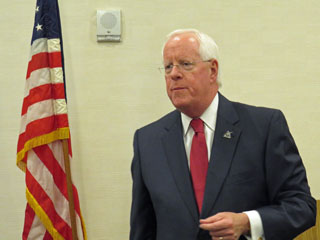
The awards were presented by William M. B. Fleming, President of Palm Beach Atlantic University. In his remarks, Mr. Fleming contrasted his institution with others which have been in the press lately with riots, shutdowns of conservative speakers and other challenges to diverse thoughts and opinions. PBAU is “not burning”, he said, and there are no “safe speech zones” necessary.
Unlike those schools who feel it necessary to publicly pledge support for “discourse”, at PBAU they embrace those things that make us an exceptional nation. In the “American Free Enterprise Statement” he passed out:
PBAU “confidently affirms the values and institutions that historically have informed American society – religious liberty; traditional Judeo-Christian morality; limited constitutional government; the Rule of Law; personal and political accountability’; and capitalism – the system of free enterprise. We believe that America is truly an exceptional nation, which was founded and has flourished under the guiding providential hand of God.”
This year’s new winners are:

Madison Andrews, Palm Beach State University. Madison moved to West Palm Beach from Utah, and now attends Palm Beach State as a sophomore. She is involved in the PBS Art Alliance Club and Student Government Association. In high school she participated in Model United Nations and most recently, has worked with Junior Achievement of the Palm Beaches and Associated General Contractors of America. Her passion is education as the basis of making changes in our country. To quote Madison, “The trouble with learning from experience is that you never quite graduate.” Her vision is to improve America’s education system by ensuring that students learn the pillars of Junior Achievement: financial literacy, work readiness, and entrepreneurship.
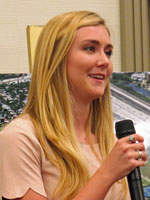
Jessica Blakely, Belmont University. Jessica, of North Palm Beach, returns to Belmont University in Nashville as a sophomore. While at Kings Academy in WPB, she was also enrolled at Palm Beach Atlantic University with courses in Public Speaking, Business and Algebra. She studied Spanish in Spain. Among her achievements, she was one of the winners of the PB POST Pathfinder Awards, a President of future Business Leaders, 2nd place winner at the PBA Entrepreneurship Challenge, and she created her own business “Make Up Doctor”. At Belmont, she was elected Congresswoman in the Student Government and participated in Intramural Volleyball. Jessica has volunteered in Haiti Missions, Belle Glade Missions, and Puerto Rico Missions, through the Christ Fellowship Office. Jessica aspires to study for a Doctorate and to work as an economic analyst at the Federal Reserve.
Returning scholars this year are:

Jenna Calderaio – Florida State University. Jenna, from Jupiter and the last of 5 children, enters her Sophomore Year at FSU where she is majoring in Business and Entrepreneurship. She was politically active with the 2015 Sunshine Summit in Orlando, witnessing 14 Presidential candidate presentations. She participates in FSU’s Republican’s Club and is very involved in the Catholic Student Union. Jenna has been selected to work on Missionary Core for the union this upcoming year. She is very active in the pro-life movement, participating in the March for Life this past January. She has plans to join the skeet and trap club and hopes to join the FBI upon graduation. This summer, she has an internship at Congressman Brian Mast’s office and another at Wall Financial Group.
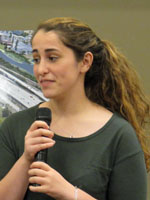
Lauren Staff – University of Florida. Lauren of Palm Beach Gardens, is entering her Junior Year at UF majoring in telecommunications. She is passionate about sports and aspires to work with ESPN or FOX Sports after she attends UF Law School. Lauren has been a staff writer for the “Florida Alligator” newspaper and also works with ESPN Gainesville radio 95.3. She has been active in Student Government, Honor Society, and Future Business Leaders and she participated in “Support our Troops” of North Palm Beach at Dwyer high school.
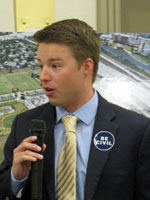
Ryan Walker – Stetson Law. Ryan, of Wellington, graduated this year from UF majoring in political science. During his career he has spent time with the campaigns of Rep. Bill Hager, Governor Rick Scott, and Candidate Chuck Clemons of Gainesville. As a REC member in PB County, he was Chair of Western Community Development and worked on the campaigns of Mayor Anne Gerwig of Wellington, and Candidate Howard Coates. He was very active at UF in the Alpha Gamma Rho fraternity. Ryan will be attending Stetson Law School this fall.

Winner’s Table with Scholarship Chair Bette Anne Starkey. (Picture by Carol Porter).
Sid Dinerstein Talks about the Trump Victory
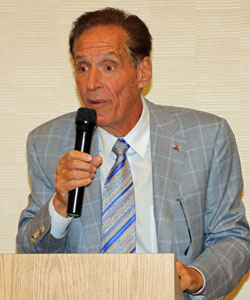
“Black People Vote on Sunday!” – with this thought, former county GOP Chairman Sid Dinerstein laid out for us all the clues that were readily available to predict the election of Donald Trump.
Describing a conversation he had with his daughter in New Hampshire on November 7, the night before the election, Sid gave us some insights into the demographics of 2016 and how it differed from when Obama was running. While at the time he wasn’t sure how it would turn out, there were encouraging signs.
The re-election of Barack Obama in 2012 saw a turnout in the black community that exceeded white turnout for the first time (on a percentage basis). Many thought the Obama coalition would turn out for Clinton and insure her victory, but it was not to be. On the traditional “souls to the polls” day – the Sunday before the election, turnout in Palm Beach County was very heavy, but the proportion of black voters seemed to be less. (Editor’s note: In fact, 24% of the 23K voters on 11/6 self-identified in voter rolls as black, compared to 33% on 11/3/2012.) This was happening all across the country.
Another clue was the polling, much of it designed by the media to suppress Republican vote.
Zander Lurie, CEO of Survey Monkey (the company that provides much of the polling muscle for the mainstream media), was known to have contributed $600K to the Clinton campaign. All pollsters are not dishonest of course, but when you know how the boss wants the poll to come out it can have an effect.
There are many ways to diddle with poll results. One that was used was to adjust the outcome to reflect the demographics of the 2012 race. Another was to adjust where the polling was done. If I wanted to make the case that independents were supporting Clinton with big numbers, I could have polled them in Century Village. Since many “independents” have a tendency to vote just like their neighbors, independents in heavily Democrat areas will lean that way.
Survey guru Nate Silver has usually been right about outcomes, but he is an aggregator of polls, not a pollster himself. Thus, if the majority of the polls show a Trump defeat, than he was led to draw that conclusion.
An ironic side-effect of this bias in the polls was over confidence by the Clinton campaign. They had no internal polling of their own and believed the polls that were skewed to make them appear to be running away with it. As a result, they neglected to campaign in Wisconsin and Michigan, believing those states to be solidly in their camp.
Also at this meeting, we heard from Steve Hyatt who is running a “candidate school” for GOP candidates down in Plantation.
The next meeting will be April 26 for which we are trying to line up a speaker from the James Madison Institute.
If you live in Palm Beach Gardens or Jupiter, please remember their is a runoff election on March 28. Republican Joe Russo is the Republican in the Gardens Group 5 race, as is Ron Delany in Jupiter District 2.
Municipal Candidates at February Lunch
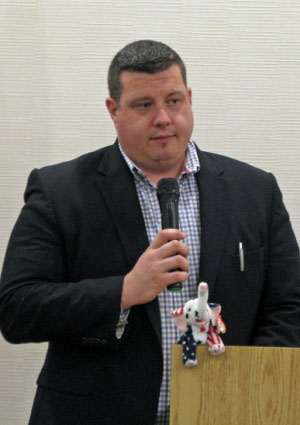
February’s lunch featured PBC GOP Executive Director Ryan Hnatiuk in support of the Republican candidates this March at the city and town level.
Municipal elected officials are the key to keeping Florida a “red state” – it is the farm team for filling spots at higher levels. Just next year for example, district 4 County Commissioner Steven Abrams and FH89 Representative Bill Hager are both term limited and both districts will be challenging to hold. (Abrams CC4 seat is D+1, and Hager’s seat is R+2). Good candidates for both of these races are needed.
Ryan is working with candidates in Palm Beach Gardens, Jupiter, Highland Beach and Lake Worth this cycle, but cautions he cannot help if there are Republicans competing against each other (as in the Gardens group 5 race which includes Joe Russo and Kevin Easton).
Since municipal races are typically about non-partisan issues like roads, taxes, capital budgets, development, etc. – there is really no rationale to discourage anyone from running, but Republican voters should at least know which of the candidates are on our side. For this, Ryan directs you to the county GOP website at www.palmbeach.gop.
Present at the meeting were some of the Palm Beach Gardens candidates who are Republicans:
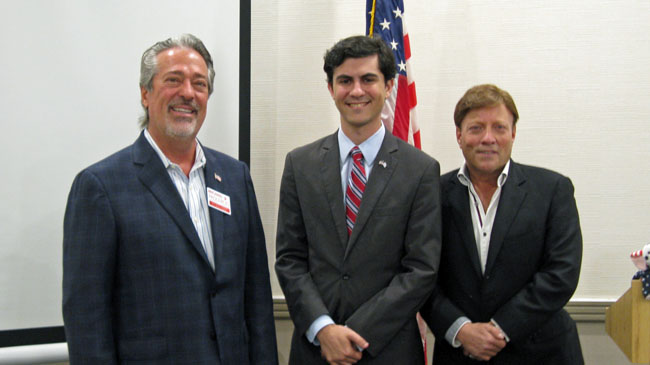
PBG Candidates Michael Paolercio (grp 1), Joe Russo (grp 5), Ron Berman (grp 3)
Committeeman Joe Budd Highlights January Lunch
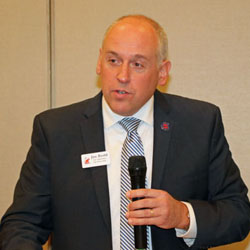
Our January meeting was anchored by newly elected state committeeman Joe Budd.
Recently returned from Washington after having witnessed the swearing in of our new President, Joe related some anecdotes from a day filled with exuberance (like standing in line next to Diamond and Silk), and interpreted Donald Trump’s inauguration speech for us.
No one should be surprised at how Trump proceeds as President, as he has been remarkably consistent from the day of his announcement in June of 2015 right up to the executive orders he signed today. Joe was an early believer, jumping on the “Trump Train” in the summer of 2015 and serving as county Vice-Chair through the campaign.
Joe broke down the inaugural speech into five themes.
First, was an indictment of the DC establishment. He took direct aim at those seated around him and didn’t pull any punches.
Second, was the intention to transfer power to the people.
Third, a list of the policies he intends to enact – improve our schools, make neighborhoods safer, create jobs, stop the flow of drugs, insure fair trade and secure our borders. Anyone who is paying attention should note the progress on these fronts in the first days of the administration.
Fourth, a “New Vision”. Joe saw biblical references in this part, specifically from the book of Haggai, which deals with the rebuilding of the temple after a period when the people had lost their way (2:18 – “Consider now from this day forward..”).
And fifth, for all Americans, the beginnings of a national pride, where “we all bleed the same red blood of patriots”.

Joe also spoke about the state party and that he has secured a seat on the board, which along with County Chair (and state vice-chair) Michael Barnett, Peter Feaman and Cindy Tindall, gives the county 4 votes out of 33.
At the conclusion of Joe’s talk, past President Melissa Nash auctioned off some Inaugural paraphernalia that she brought back to raise money for the scholarship fund.
Next month’s meeting on Februrary 22 will feature County GOP Political Director Ryan Hnatiuk.
For those that live in Palm Beach Gardens, the club is co-sponsoring a candidate forum for the 9 city council candidates at the Gardens branch of the county library. The meeting will start at 6:15 on Tuesday, February 28 and will be moderated by WJNO radio host Brian Mudd.
Dimensional Harmony Brightens our December Lunch
Our Christmas lunch was enhanced by the sweet tones of Dimensional Harmony from Boynton Beach High School and their leader Sterling Frederick.
The a cappella chorus did a range of traditional Christmas songs, as well as some of their pop favorites, highlighted by some very excellent soloists.
The group will soon be performing at Carnegie Hall.
Mark your calendar’s for next month’s meeting on January 25 which will feature newly elected PBC Committeeman Joe Budd. Joe will discuss what to expect in the coming year, both from the Trump Administration and from RPOF.
Ballot Amendments Discussed at October Lunch
Clear differences of opinion were expressed by our speakers at the 2016 Ballot Question Forum, hopefully providing the information needed to cast a vote for all the right reasons.
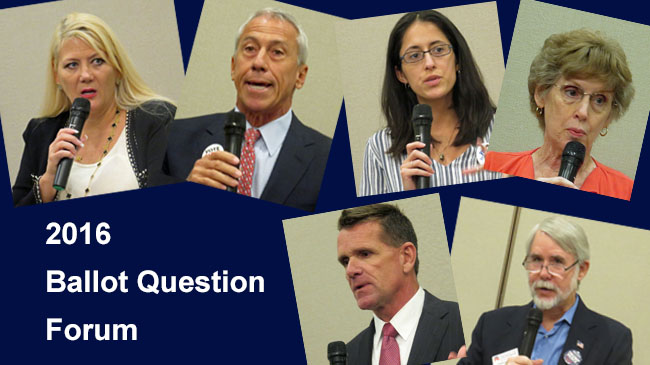
Clockwise from upper left: Cindy Tindell, Richard Pinsky, Bianca Garza, Virginia Brooks, Fred Scheibl, Bill Perry
Kicked off by moderator Fred Scheibl, who gave an overview of the questions and drilled down on amendments 3 and 5, we had pro and con speakers for the solar amendment (1), medical marijuana (2) and the county sales tax increase.
Amendment 3, which adds totally and permanently disabled first responders to the list of groups getting extra homestead exemptions, is an enabling amendment. If passed, the legislature will have to fill in the details, including the amount of the exemption.
Amendment 5 is a tweak to the previously passed amendment which provides an extra homestead exemption to low income seniors by allowing the exemption to continue, even if rising valuations raise the home value above the $250K threshold.
On the Solar Energy Amendment 1, Cindy Tindell, Vice President of Nextera Energy (parent of Florida Power & Light) explained the amendment from the utilities point of view – that the desire is to not reimburse the retail price of energy to the generating consumer as is now the practice with net metering. Utility generating plants, with all their overhead, are only reimbursed at the wholesale energy price she explained, and it is unfair to treat solar generating consumers more favorably.
Not so fast, said Ackerman public policy manager Richard Pinsky. The energy that flows back into the grid from a net metering device is only returning the energy it has already paid for at the retail price. He compared the situation to a water company charging its customers for rainwater they collected in a barrel.
That the effect of the amendment turns on the pricing model for net metering was enlightening to some, as the ballot language only talks vaguely about “subsidizing the costs of backup power and electric grid access.” An old rule of thumb says that if the effect of an amendment or statute is not easily understood, there is probably a reason – vote no if there is any doubt.
For Medical marijuana amendment 2, which came very close to passing (57.6%) in 2014, Bianca Garza, Communications Director of United for Care made the case for the effectiveness of marijuana derivatives for many medical conditions and the safety and good results that have been experienced in the states that have implemented similar programs.
Opposing the amendment, Virginia Brooks took us through a list of considerations, including non precise administration amounts, sourcing of prescriptions outside of the pharmacy system, use of a prescription drug not vetted through clinical trials, access to the drugs by children in the household, and other potential problems.
Regarding the county sales tax increase to 7%, Bill Perry, CEO of Gunster and the incoming chairman of the PBC Economic Council made the case based on the need for a long list of infrastructure repairs, and the advantages that a sales tax has over borrowing the money with a bond issue.
Opposing the tax, Fred Scheibl, argued that the infrastructure shortfall could have been addressed in the normal budget process but a conscious choice was made to divert Engineering and Public Works funds to other priorities like employee raises (12.5% in 5 years), and the proposal comes on top of the highest property taxes in county history. The sales tax is a “blunt instrument” and will raise the $2.7B whether it is needed or not. A bond on the other hand (which can be used if the tax is defeated) can borrow only enough money to address the really critical needs.
For more information on the ballot amendments and sales tax question, see our voters guide to the ballot questions.

